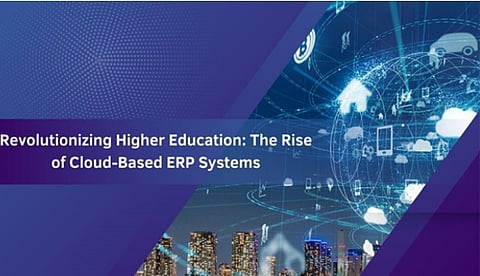

In the ever-evolving digital landscape, cloud-based Enterprise Resource Planning (ERP) systems are revolutionizing higher education by streamlining administrative processes, enhancing data security, and optimizing institutional efficiency. Sanjiv Kumar Bhagat, an expert in enterprise technology, examines how these innovations are transforming academic operations, addressing legacy system challenges, and paving the way for a more agile and data-driven educational environment.
Higher education institutions have traditionally relied on fragmented IT infrastructures, with separate systems managing student records, finances, and administration. This siloed approach increases maintenance costs, limits scalability, and poses security risks. Cloud-based ERP systems offer a transformative solution by integrating all institutional data into a centralized, secure, and scalable platform.
These systems enhance accessibility, streamline operations, and reduce IT overhead, enabling institutions to adapt to evolving educational demands. By eliminating data silos and improving interoperability, cloud ERP fosters efficiency, real-time decision-making, and a seamless user experience for students, faculty, and administrators, driving digital transformation in higher education.
Data security remains a top priority in higher education, with institutions handling sensitive student records, financial information, and research data. Modern cloud ERP solutions incorporate advanced security layers, including encryption, role-based access controls, and continuous network monitoring. These measures have significantly reduced security breaches, with cloud ERP-equipped institutions reporting 36% fewer critical incidents compared to legacy systems.
Cloud ERP adoption brings substantial cost savings, reducing IT infrastructure expenses by 30-40%. Institutions leveraging these systems report an average 25.6% reduction in operational costs over five years. Automation of administrative tasks such as student registration, financial aid processing, and faculty payroll management further enhances efficiency, cutting processing times by up to 38%.
Unlike monolithic legacy systems, modern cloud ERP platforms use a service-oriented architecture, enabling modular implementation. This approach allows institutions to transition in phases, beginning with critical areas like finance and human resources before expanding to student management and research administration. The modular design also ensures scalability, accommodating growing student populations without significant infrastructure overhauls.
A major advantage of cloud ERP systems is the seamless integration of disparate data sources, creating a unified information ecosystem. This enables real-time analytics for informed decision-making, allowing academic administrators to optimize resource allocation, track student performance, and forecast institutional needs more accurately. Centralized data management eliminates inconsistencies, reducing reconciliation efforts by 30-35%.
AI and machine learning are transforming cloud ERP in higher education. AI-driven analytics help identify at-risk students by analyzing attendance, academic performance, and participation data, enabling timely intervention. Intelligent automation streamlines administrative tasks, reducing manual effort and improving efficiency. By automating routine processes, AI allows staff to focus on complex decision-making and student engagement. As AI continues to evolve, cloud ERP systems will become more adaptive and data-driven, enhancing institutional efficiency and student success.
Blockchain technology is revolutionizing academic credential management, ensuring secure, tamper-proof records for students and institutions. Integrating blockchain with cloud ERP systems allows seamless verification of degrees, certifications, and transcripts, reducing administrative overhead and eliminating fraudulent claims. Institutions adopting blockchain-based credentials enhance global recognition and facilitate cross-border academic mobility.
The Internet of Things (IoT) transforms smart campuses by integrating with cloud-based ERP systems for real-time resource monitoring. It enables precise tracking of classroom occupancy, optimizing facility usage through smart scheduling. Energy management systems reduce waste, while predictive maintenance lowers operational costs by addressing issues before failures occur.
IoT-powered security enhances safety by monitoring access points and detecting anomalies in real-time, ensuring a secure environment for students and staff. This interconnected ecosystem streamlines campus operations, improves efficiency, and fosters a more sustainable, technology-driven learning environment, making campuses smarter, safer, and more cost-effective.
Apart from every positive aspect about taking up cloud based ERP, there are drawbacks that above all doubt lie with how easy the integration is when it comes to the specialized academic systems. On the other hand, the technique of score transformation and automatic pipeline reloading ETL has minimized the percentage of errors in information transfer, and thus is abundantly employed. API channeling and event activation structures, help in the easy connection with the old approaches of a cloud based ERP system.
We can assert that enhancement of cloud ERP systems will be beneficial for the development of higher education. Such technologies have become a competitive advantage in efficiency, as well as in terms of information and educational projects concerning the students. The present tendency is that most organizations are investing remarkable budgets on emerging technologies in the range of Artificial Intelligence, Block chain, IoT etc. and putting conventional cloud ERP at the heart of their academic management system. Sanjiv Kumar Bhagat points out that institutions that will use these technologies will change learning in the digital age.
